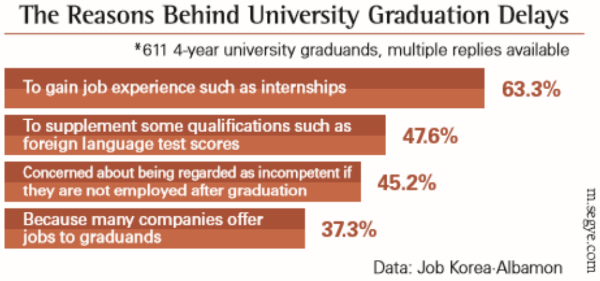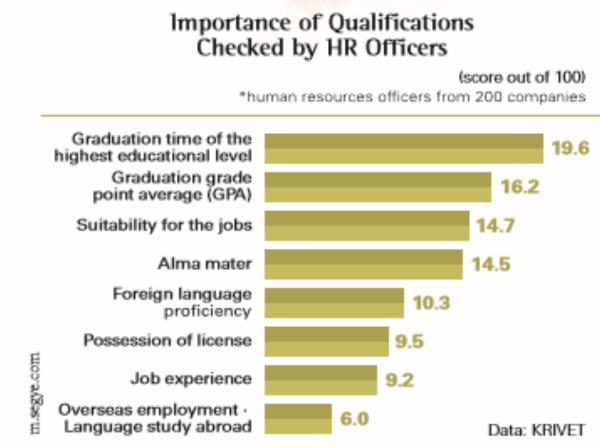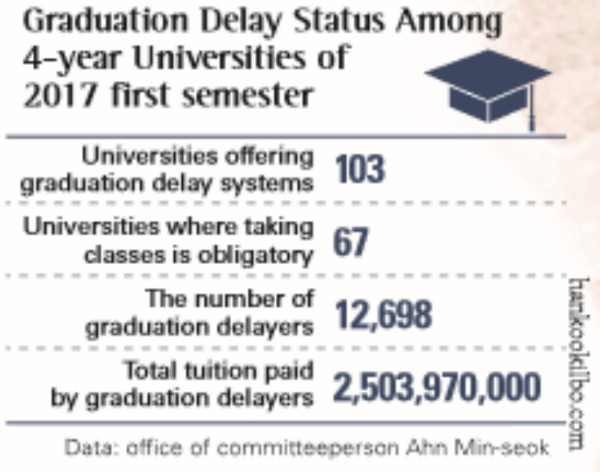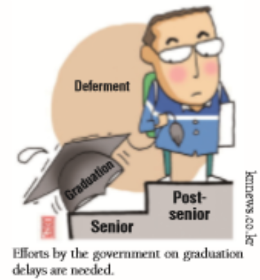This semester is the last one for University Student A until graduation, but her graduation gown and cap are still a long way off. Just like A there are some students who will be in an ambiguous position when this semester ends at the end of December. They are graduation delayers, who are neither an officially enrolled student nor alumni. As the number of students who decide to postpone their graduation increases, their stories are becoming a social issue. In this article, therefore, the Sungkyun Times (SKT) looks into the identity of graduation delayers, problems around them, and support plans for them.
Youths Tied to the University
Graduation Delayers: Who Are They and How Many Are There?
Delaying graduation literally means to postpone one’s graduation for a certain period to maintain registered college student status, even after meeting the requirements for graduation. A graduation delayer refers to not only those who merely postponed the date of their graduation, but also those who are attending additional semesters or taking a long break from school. The number of students delaying graduation is increasing in order for them to officially remain classified as students until they get a job. According to the complete enumeration data on the operational condition of graduation postponement by the Ministry of Education, 130 of 197 universities in Korea had graduation delay systems and about 15,898 students were delaying their graduation as of February 2017. If you were to include those who are avoiding graduation by leaving two to three credits uncompleted, the actual number of graduation delayers would be greater than that.
Why Are They Not Leaving?
#1 Economical Approach: Job Market Preferring Graduands

According to a 2017 survey on 611 university graduands, those who are eligible to graduate but have not yet graduated, by job placement portals JobKorea and Albamon, “to build up job experience such as internships” was the biggest reason (63%) behind graduation postponement. It is indeed difficult for students to gain job experience such as internships during the semester in parallel with studying. Besides, support in job hunting from universities is unlikely to be provided to graduates.
In fact, Human Resource (HR) officers do agree that the time of graduation has an influence on the recruiting process. In a survey conducted by the Korea Research Institute for Vocational Education & Training (KRIVET), HR officers from 200 companies graded “the graduation time of the highest educational level” as highest among eight qualifications that are perceived as important in the resume screening process. Graduands even had a 50 times higher probability of passing the resume screening process than job seekers who graduated more than three years ago, although these two groups did not differ much in other qualifications. Moreover, regardless of how prestigious the university is, the possibility of passing the screening phase dropped to about 9.1% if three years after graduation had passed. That is, university students could not help but stay in college in order to increase their chances of getting a job in a harsh society where being employed is almost impossible these days.

#2 Socio-psychological Approach: Avoidance of the Institutional State of Weightlessness
Raised in a society where every stage from birth until university graduation is exquisitely standardized, university students often decide to delay their graduation due to the fear of being in the institutional state of weightlessness after graduation. Students enter the institutional state of weightlessness when they are harassed by the anxiety of missing a sense of belonging. In this context, the sense of belonging should be interpreted as one where the outcome of their efforts emerge, rather than one that can be felt just by being in a place or organization. The fear should also be understood as deriving from the failure to set aside any place to replace college society where they could gain recognition. In other words, students choose to postpone their graduation as a temporary avoidance for the anxiety over the reality they should face and the dread of being outside of the fences of university.
What Makes Them So Distressed?
Burdensome Tuition
According to the Ministry of Education, the total tuition that graduation delayers paid in the first semester of 2017 was about 2.5 billion. Most of the public universities offering the graduation delay system are receiving 1/6 of the original tuition, and private universities, who follow their distinct tuition policies, received tuition which varied from nothing to at least 500,000. Sixty-seven universities, more than half of the 103 four-yearcourse colleges that offered graduation delay systems this year, made it obligatory for graduation delayers to take classes. Graduation delayers, in turn, complained of the economic burden due to the costs of postponing their graduation. Students whose financial conditions are unfavorable, consequently, are likely to lose the opportunity to delay graduation. One student who delayed her graduation last semester, for example, reported that even though getting a job is uncertain, she eventually decided to graduate due to the triple burden of having a part-time job to make a living, make preparations for job hunting, and 500,000 tuition per semester. Universities, on the other hand, argue that they need to take the tuition from graduation delayers because of the costs that occur by undertaking them. Seo Ji-young, policy research director of the Korean Council for University Education, said, “Even though students postpone their graduation, they are classified as enrolled students, giving the university disadvantages in the evaluation indexes graded by the Ministry of Education. They also keep using some facilities such as libraries, so it is hard to regard it as a matter of the university alone.” Since graduation delay system policies differ for each institution without any legal standards, the criterion of the costs is vague. Additionally, the tuition for graduation delayers is getting relatively less attention from the public than normal tuition or admission fees which are some of the hottest social issues today.

Unsubstantial Graduation Delays More of a Poison
Many students may have initially decided to delay their graduation due to the unemployment crisis, but then were just swept away by the social phenomenon, as some do delay their graduation meaninglessly without any concrete purpose or goal. This kind of graduation delay, however, might have a negative influence on the job market. An analysis by the National Youth Policy Institute shows that purposeless graduation delayers had lower monthly income levels in the labor market than those who had distinct goals after graduation. According to a survey done by the same organization on graduation delayers, 48% of them actually looked for work after deferring their graduation, whereas 52% did not. It can be inferred that a considerable number of students choose to delay their graduation not just for job-seeking purposes, but also to follow the societal flow. That is, graduation delays are becoming a social phenomenon among the youth, without any purpose rather than just for a sense of belonging.
Special Measures for the Bound Youths
Graduation delay is not a system existing only in Korea. Similar instances can be found in Taiwan, China, and Japan. Among other countries, the graduation postponement phenomenon in Taiwan especially shows highly similar aspects with that of Korea. Besides, the fact that the Taiwanese government actively cooperates with universities to help solve the problem offers some implications for Korea.
Taiwan, Close Cooperation Between the Government and the Universities
Sharing similar backgrounds and reasons regarding the increase of graduation delays, Taiwan is the only country in which the government has established a related policy and is implementing it. From the early 2000s, the Ministry of Education and the National Statistical Office of Taiwan started to officially count the number of graduation delayers. In 2013, the government established a concrete measure of “Graduation Delay Condition of University and College Students and Counterstrategy” against the graduation delay phenomenon and started to implement it. The action that the Taiwanese government takes is to reinforce the role and function of the university, and is divided into two main streams: policy of the Ministry of Education and the actions of the university. The case of Taiwan conveys the need of close cooperation between the government and the university in order to solve the pervasive graduation deferment, which is an increasingly important social issue.
Need for Government Action
In October, Ahn Min-seok, committeeperson of the Education, Culture, Sports, and Tourism Committee, proposed a partly revised bill of higher education act to ban universities from obligating their graduate delayers to take classes or pay tuition. The revised bill, however, will be pending in Congress for nine months. The Ministry of Education also started to counteract through a policy which offered an improvement plan on university undergraduate degrees, but it is on its last legs as the revision of the related bills are being delayed. Given the example of Taiwan, there is a need for cooperation between the Korean government and universities to support the job-seeking of graduation delayers and repair the system that can moderate their economic burdens. Jun Hee-kyung, committeeperson of the Education, Culture, Sports, and Tourism Committee, said, “If the universities arrange their own criteria and repair their systems to lessen the burden of graduation delayers, the government should provide them with financial support, solving the problem together with the universities and the Ministry of Education as well.”

Graduation Delays at SKKU
Kingos who have decided to delay their graduation from SKKU so that they can still be graduands in the job market do exist as well. According to the school administration office, there are 2,948 graduation delayers at SKKU as of November 2017.
SKKU does not have an official graduation delay system, but Kingos can become graduation delayers by not submitting required documents until they are ready to leave SKKU. Following statutes Article 37, SKKU admits the completion of Kingos in their degree if they (1) registered more than eight semesters, (2) acquired more than the required credits of each degree and (3) meet the minimum grade point average (GPA) designated by their majors. Therefore, students who meet all of the criteria above automatically become graduation delayers. Those students can finally graduate when they submit their graduation thesis and meet the 3-pum Certification, which is SKKU’s distinctive graduation requirement that encourages Kingos to develop proper personalities, international mindsets and creativity. Once Kingos become graduation delayers, they are distinguished from normal enrolled students in that they are semi-university graduates. They do not pay tuition, and accordingly cannot take any classes. Regarding the libraries, they can access them but cannot borrow books, and they are not allowed to utilize the reading rooms during mid-term or final periods.
Universities should be a stepping stone for youths who are ready to take flight in the world, rather than a stone that seizes them to the ground. As more and more students are deciding to postpone their graduation mainly due to the unemployment crisis, the government and the universities should cooperate and try their best to solve this problem. Only when students are freed from the chains preventing them to leave will society be more healthy, vital and dynamic.
